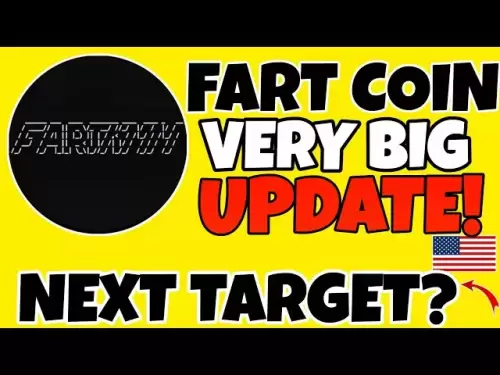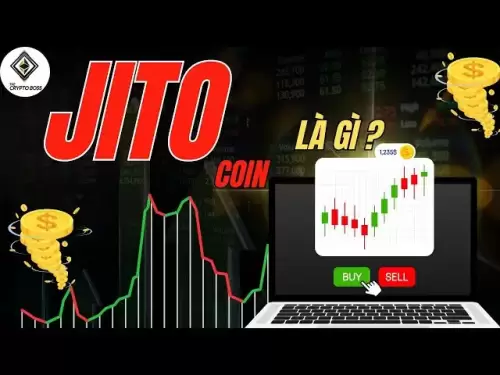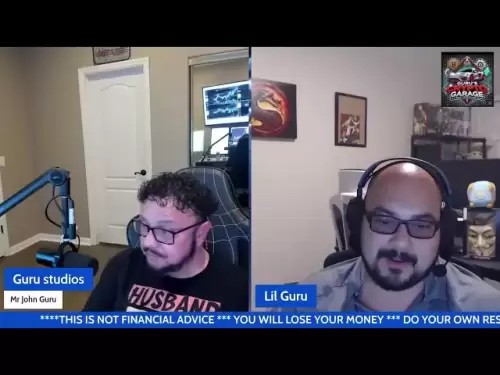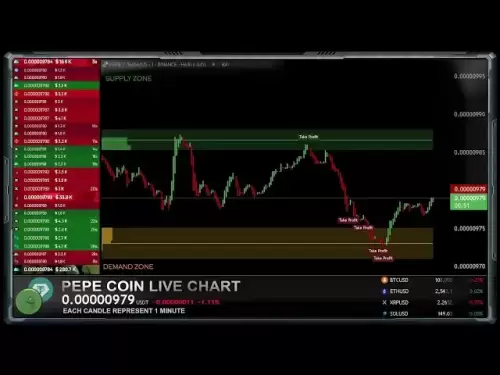-
 Bitcoin
Bitcoin $107,810.8710
-1.45% -
 Ethereum
Ethereum $2,531.4386
-1.75% -
 Tether USDt
Tether USDt $1.0000
-0.03% -
 XRP
XRP $2.2542
-0.99% -
 BNB
BNB $659.1350
-0.50% -
 Solana
Solana $148.5456
-2.40% -
 USDC
USDC $0.9999
-0.02% -
 TRON
TRON $0.2868
-0.44% -
 Dogecoin
Dogecoin $0.1666
-3.65% -
 Cardano
Cardano $0.5751
-2.36% -
 Hyperliquid
Hyperliquid $37.6845
-5.51% -
 Bitcoin Cash
Bitcoin Cash $494.9448
-0.65% -
 Sui
Sui $2.8396
-3.31% -
 Chainlink
Chainlink $13.2423
-2.59% -
 UNUS SED LEO
UNUS SED LEO $9.0482
0.02% -
 Stellar
Stellar $0.2467
-2.44% -
 Avalanche
Avalanche $17.8165
-3.63% -
 Shiba Inu
Shiba Inu $0.0...01158
-2.41% -
 Toncoin
Toncoin $2.7397
-3.42% -
 Hedera
Hedera $0.1560
-2.73% -
 Litecoin
Litecoin $85.8559
-2.34% -
 Monero
Monero $315.3710
-2.30% -
 Dai
Dai $1.0001
0.00% -
 Polkadot
Polkadot $3.3443
-2.03% -
 Ethena USDe
Ethena USDe $1.0001
0.01% -
 Bitget Token
Bitget Token $4.2888
-3.73% -
 Uniswap
Uniswap $7.3388
-1.57% -
 Aave
Aave $278.2986
-3.05% -
 Pepe
Pepe $0.0...09807
-3.67% -
 Pi
Pi $0.4563
-2.39%
Is it safe to buy Bobo Coin on a decentralized exchange?
When considering Bobo Coin purchases on DEXs, ensure the platform's legitimacy via reviews, smart contract evaluations, and the avoidance of phishing scams for enhanced security.
Dec 27, 2024 at 09:31 pm
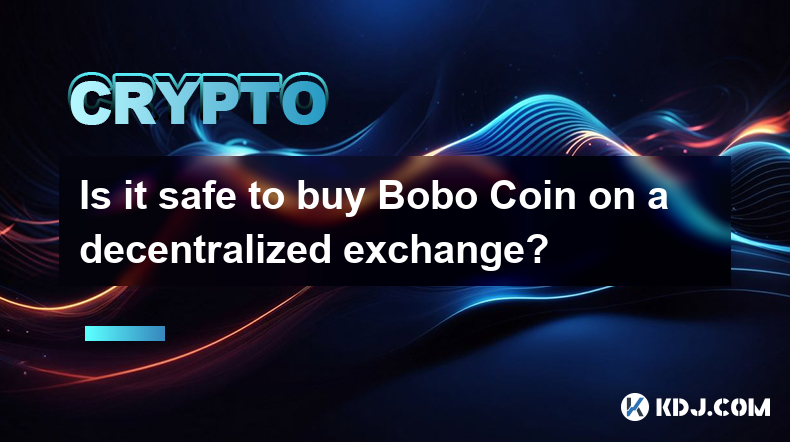
Key Points:
- Definition of decentralized exchanges (DEXs)
- Advantages and disadvantages of using DEXs
- Security considerations for Bobo Coin on DEXs
- Guide to evaluating the legitimacy of DEXs
- Tips for safely purchasing Bobo Coin on DEXs
Is it Safe to Buy Bobo Coin on a Decentralized Exchange?
Decentralized exchanges (DEXs) have emerged as an important part of the cryptocurrency ecosystem, providing users with new opportunities for trading assets. However, it is important to evaluate the security considerations associated with using DEXs before buying any cryptocurrency, including Bobo Coin.
Understanding Decentralized Exchanges
DEXs are platforms that facilitate the decentralized trading of cryptocurrencies. Unlike centralized exchanges, which hold users' funds and control the trading process, DEXs operate on a peer-to-peer basis, enabling users to trade directly with each other without the need for an intermediary. This decentralized structure offers several advantages:
- Increased security: DEXs eliminate the risk of exchange hacks or compromises as they do not hold users' funds.
- Greater privacy: DEXs typically do not require users to provide personal information, enhancing privacy.
- Transparency: The trading data on DEXs is publicly available, providing transparency and accountability.
Advantages and Disadvantages of DEXs
While DEXs offer several advantages over centralized exchanges, there are also some potential disadvantages to consider:
Advantages:
- Enhanced security
- Greater privacy
- Transparency
- Resistance to censorship
- Access to a wider range of trading pairs
Disadvantages:
- Limited liquidity, especially for lesser-known or less-traded cryptocurrencies
- More complex user interface and trading process
- Potential vulnerabilities due to smart contract risk
- Lack of customer support compared to centralized exchanges
Security Considerations for Bobo Coin on DEXs
When buying Bobo Coin on a DEX, it is essential to be aware of the security considerations:
- Smart contract risk: Smart contracts power the operations on DEXs. Potential vulnerabilities in the smart contracts that support Bobo Coin could lead to losses.
- Rug pull risk: Scammers may create fake projects or coins with the sole intention of abandoning the project and absconding with investor funds.
- Phishing scams: Fraudsters may create phishing websites or emails that impersonate legitimate DEXs to trick users into revealing their private keys.
Evaluating the Legitimacy of DEXs
Before using any DEX to buy Bobo Coin, it is crucial to evaluate its legitimacy:
- Research the DEX: Look for reviews, ratings, and user feedback on reputable websites or forums.
- Check the DEX's website: Examine the website's design, content, and grammar for any red flags.
- Verify the DEX's smart contracts: Review the DEX's smart contracts using a reputable code auditor or research firm.
- Beware of phishing scams: Always double-check the URL of the DEX's website and be cautious of emails or messages asking you to provide sensitive information.
Tips for Safely Purchasing Bobo Coin on DEXs
To minimize security risks while buying Bobo Coin on DEXs, follow these tips:
- Use a reputable DEX: Choose a DEX with a strong reputation, positive user reviews, and audited smart contracts.
- Protect your private key: Never share your private key with anyone. Store it in a secure wallet and avoid using it on multiple platforms.
- Be aware of phishing scams: Stay vigilant for phishing emails, websites, or social media messages that may try to trick you into revealing sensitive information.
- Trade with small amounts: Start with small trades until you become more comfortable with the DEX's platform and security measures.
- Consider using a hardware wallet: For added security, consider using a hardware wallet to store your Bobo Coin and other crypto assets.
FAQs
- What is Bobo Coin?
Bobo Coin is a hypothetical cryptocurrency created for the purpose of this article. It is not a real cryptocurrency. - What is a rug pull?
A rug pull is a scam in which the creators of a new cryptocurrency abandon the project and sell off their holdings, leaving investors with worthless tokens. - How do I verify the legitimacy of a DEX?
Research the DEX's reviews, website, smart contracts, and user feedback. Be cautious of phishing scams and double-check all URLs. - Can I buy Bobo Coin on centralized exchanges?
This article does not provide information on whether Bobo Coin is available on centralized exchanges. - Is it safe to store my Bobo Coin on a DEX?
DEXs do not hold user funds. Bobo Coin would need to be stored in a non-custodial wallet for optimal security.
Disclaimer:info@kdj.com
The information provided is not trading advice. kdj.com does not assume any responsibility for any investments made based on the information provided in this article. Cryptocurrencies are highly volatile and it is highly recommended that you invest with caution after thorough research!
If you believe that the content used on this website infringes your copyright, please contact us immediately (info@kdj.com) and we will delete it promptly.
- Pump.fun's PUMP Token and Gate.io: A $4 Billion Meme Coin Gamble?
- 2025-07-08 16:30:12
- DigitalX, BTC Holdings, Funding Secured: Aussie Crypto Firm Goes Big on Bitcoin
- 2025-07-08 17:10:12
- Acquire.Fi: Navigating the Web3 M&A Landscape as a Consultant
- 2025-07-08 16:30:12
- Chainlink (LINK) Price Analysis: Navigating Uncertainty with Analysts' Insights
- 2025-07-08 16:50:12
- Rare 50p Coins Spark Bidding Wars: Are You Sitting on a Goldmine?
- 2025-07-08 16:50:12
- Iron Maiden's 50th Anniversary Gets Royal Treatment with Limited Edition Coin
- 2025-07-08 16:55:12
Related knowledge

How to customize USDT TRC20 mining fees? Flexible adjustment tutorial
Jun 13,2025 at 01:42am
Understanding USDT TRC20 Mining FeesMining fees on the TRON (TRC20) network are essential for processing transactions. Unlike Bitcoin or Ethereum, where miners directly validate transactions, TRON uses a delegated proof-of-stake (DPoS) mechanism. However, users still need to pay bandwidth and energy fees, which are collectively referred to as 'mining fe...

USDT TRC20 transaction is stuck? Solution summary
Jun 14,2025 at 11:15pm
Understanding USDT TRC20 TransactionsWhen users mention that a USDT TRC20 transaction is stuck, they typically refer to a situation where the transfer of Tether (USDT) on the TRON blockchain has not been confirmed for an extended period. This issue may arise due to various reasons such as network congestion, insufficient transaction fees, or wallet-rela...

How to cancel USDT TRC20 unconfirmed transactions? Operation guide
Jun 13,2025 at 11:01pm
Understanding USDT TRC20 Unconfirmed TransactionsWhen dealing with USDT TRC20 transactions, it’s crucial to understand what an unconfirmed transaction means. An unconfirmed transaction is one that has been broadcasted to the blockchain network but hasn’t yet been included in a block. This typically occurs due to low transaction fees or network congestio...

How to check USDT TRC20 balance? Introduction to multiple query methods
Jun 21,2025 at 02:42am
Understanding USDT TRC20 and Its ImportanceUSDT (Tether) is one of the most widely used stablecoins in the cryptocurrency market. It exists on multiple blockchain networks, including TRC20, which operates on the Tron (TRX) network. Checking your USDT TRC20 balance accurately is crucial for users who hold or transact with this asset. Whether you're sendi...

What to do if USDT TRC20 transfers are congested? Speed up trading skills
Jun 13,2025 at 09:56am
Understanding USDT TRC20 Transfer CongestionWhen transferring USDT TRC20, users may occasionally experience delays or congestion. This typically occurs due to network overload on the TRON blockchain, which hosts the TRC20 version of Tether. Unlike the ERC20 variant (which runs on Ethereum), TRC20 transactions are generally faster and cheaper, but during...

The relationship between USDT TRC20 and TRON chain: technical background analysis
Jun 12,2025 at 01:28pm
What is USDT TRC20?USDT TRC20 refers to the Tether (USDT) token issued on the TRON blockchain using the TRC-20 standard. Unlike the more commonly known ERC-20 version of USDT (which runs on Ethereum), the TRC-20 variant leverages the TRON network's infrastructure for faster and cheaper transactions. The emergence of this version came as part of Tether’s...

How to customize USDT TRC20 mining fees? Flexible adjustment tutorial
Jun 13,2025 at 01:42am
Understanding USDT TRC20 Mining FeesMining fees on the TRON (TRC20) network are essential for processing transactions. Unlike Bitcoin or Ethereum, where miners directly validate transactions, TRON uses a delegated proof-of-stake (DPoS) mechanism. However, users still need to pay bandwidth and energy fees, which are collectively referred to as 'mining fe...

USDT TRC20 transaction is stuck? Solution summary
Jun 14,2025 at 11:15pm
Understanding USDT TRC20 TransactionsWhen users mention that a USDT TRC20 transaction is stuck, they typically refer to a situation where the transfer of Tether (USDT) on the TRON blockchain has not been confirmed for an extended period. This issue may arise due to various reasons such as network congestion, insufficient transaction fees, or wallet-rela...

How to cancel USDT TRC20 unconfirmed transactions? Operation guide
Jun 13,2025 at 11:01pm
Understanding USDT TRC20 Unconfirmed TransactionsWhen dealing with USDT TRC20 transactions, it’s crucial to understand what an unconfirmed transaction means. An unconfirmed transaction is one that has been broadcasted to the blockchain network but hasn’t yet been included in a block. This typically occurs due to low transaction fees or network congestio...

How to check USDT TRC20 balance? Introduction to multiple query methods
Jun 21,2025 at 02:42am
Understanding USDT TRC20 and Its ImportanceUSDT (Tether) is one of the most widely used stablecoins in the cryptocurrency market. It exists on multiple blockchain networks, including TRC20, which operates on the Tron (TRX) network. Checking your USDT TRC20 balance accurately is crucial for users who hold or transact with this asset. Whether you're sendi...

What to do if USDT TRC20 transfers are congested? Speed up trading skills
Jun 13,2025 at 09:56am
Understanding USDT TRC20 Transfer CongestionWhen transferring USDT TRC20, users may occasionally experience delays or congestion. This typically occurs due to network overload on the TRON blockchain, which hosts the TRC20 version of Tether. Unlike the ERC20 variant (which runs on Ethereum), TRC20 transactions are generally faster and cheaper, but during...

The relationship between USDT TRC20 and TRON chain: technical background analysis
Jun 12,2025 at 01:28pm
What is USDT TRC20?USDT TRC20 refers to the Tether (USDT) token issued on the TRON blockchain using the TRC-20 standard. Unlike the more commonly known ERC-20 version of USDT (which runs on Ethereum), the TRC-20 variant leverages the TRON network's infrastructure for faster and cheaper transactions. The emergence of this version came as part of Tether’s...
See all articles





















